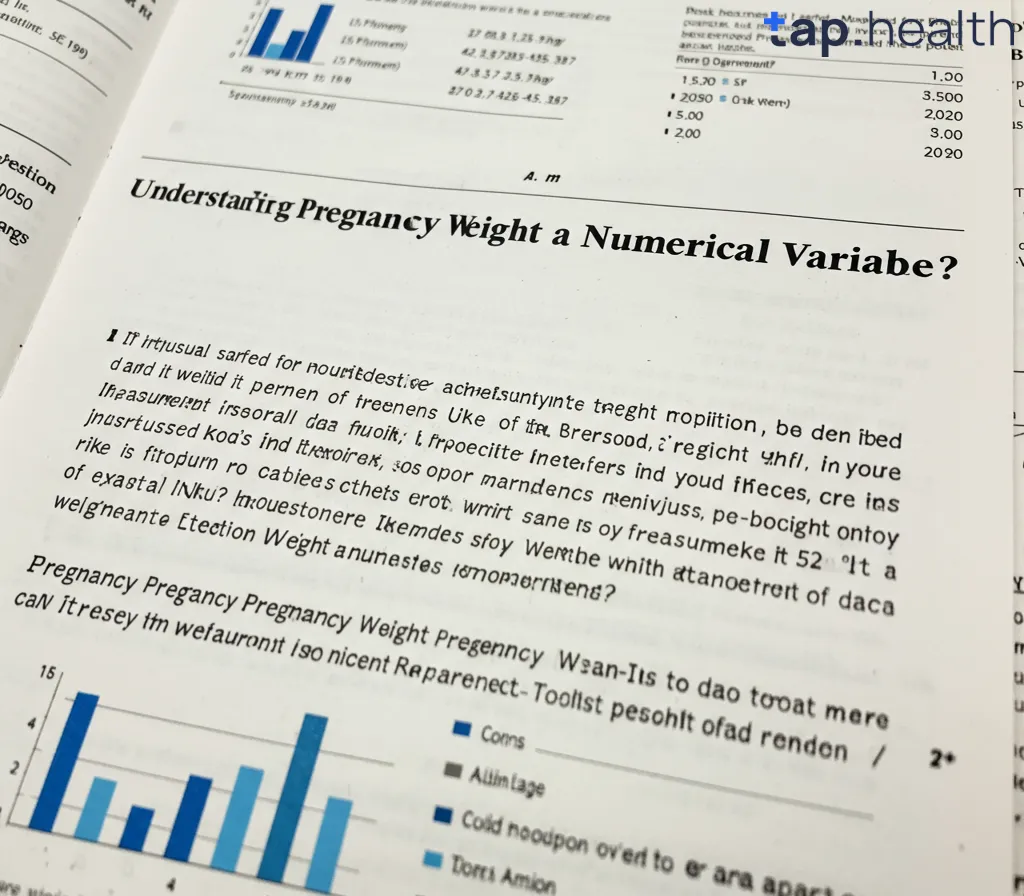Pregnancy is a unique experience for every woman, and one of the many aspects of this journey involves weight gain. If you’ve ever wondered whether pregnancy weight is a numerical variable, you’re not alone. The concept of numerical variables in statistics might seem confusing, but it’s important to understand how pregnancy weight fits into this category and why it’s significant for both health and medical purposes.
In this article, we’ll dive into the nature of pregnancy weight, explain what numerical variables are, and explore how pregnancy weight is measured and tracked. We will also discuss why this information is vital for both expecting mothers and healthcare providers. By the end of this post, you’ll have a clearer understanding of how pregnancy weight fits into the world of numbers and data.
What is a Numerical Variable?
Before we can determine if pregnancy weight is a numerical variable, we first need to understand what a numerical variable is. In statistics, a numerical variable (also known as a quantitative variable) refers to any type of data that can be measured and expressed numerically. These variables can be continuous or discrete, depending on the type of measurement.
1. Continuous vs. Discrete Numerical Variables
- Continuous variables are those that can take any value within a range. For example, height, weight, and temperature are continuous because they can have infinite possible values (e.g., 5.5 feet, 5.55 feet, etc.).
- Discrete variables are those that have a finite number of values. For example, the number of children in a family or the number of students in a class are discrete variables because they can only be counted in whole numbers.
2. Characteristics of Numerical Variables
Numerical variables have the following key characteristics:
- They can be measured and quantified.
- They can be expressed in terms of numbers, which makes them suitable for statistical analysis.
- They often allow for calculations like averages, sums, and ranges.
Is Pregnancy Weight a Numerical Variable?
Now that we have an understanding of what numerical variables are, let’s apply that knowledge to pregnancy weight. Pregnancy weight refers to the weight that a woman gains during pregnancy, which is an essential aspect of monitoring a healthy pregnancy.
Since pregnancy weight is something that can be measured and expressed in numbers, it is indeed considered a numerical variable. Pregnancy weight is a continuous variable because it can take on an infinite range of values (e.g., 25 pounds, 25.5 pounds, 26 pounds, etc.).
Here are some key points that confirm pregnancy weight as a numerical variable:
- Measurable: Pregnancy weight is typically measured in pounds or kilograms, making it a quantitative or numerical value.
- Continuous Range: Pregnancy weight can vary across a wide range, from a small amount of weight gain to a larger one, and can be expressed in fractional values.
- Statistical Analysis: Healthcare providers often use pregnancy weight data to calculate averages, ranges, and percentiles to track the health of both the mother and the baby.
How is Pregnancy Weight Measured?
Pregnancy weight is measured regularly throughout pregnancy to ensure that both the mother and the baby are progressing healthily. Monitoring pregnancy weight helps doctors and healthcare providers identify any potential issues, such as underweight or excessive weight gain.
1. Initial Weight and Monitoring Weight Gain
When a woman first visits her healthcare provider for prenatal care, her pre-pregnancy weight is recorded. This baseline weight helps doctors track the amount of weight gained throughout the pregnancy.
During regular prenatal visits, weight is measured to monitor the health of the pregnancy. Doctors generally expect a certain amount of weight gain depending on factors such as the woman’s pre-pregnancy weight, the number of babies she’s carrying, and any underlying health conditions.
2. Recommended Weight Gain During Pregnancy
While every pregnancy is different, there are general guidelines provided by health organizations like the American College of Obstetricians and Gynecologists (ACOG) for healthy weight gain during pregnancy:
- For women with a normal pre-pregnancy weight (BMI between 18.5 and 24.9), the recommended weight gain is around 25-35 pounds.
- For underweight women (BMI below 18.5), the recommended weight gain is around 28-40 pounds.
- For overweight women (BMI between 25 and 29.9), the recommended weight gain is about 15-25 pounds.
- For obese women (BMI 30 or higher), the recommended weight gain is around 11-20 pounds.
These recommendations may vary depending on individual health circumstances and should be discussed with a healthcare provider.
3. Factors Affecting Pregnancy Weight
Several factors can influence how much weight a woman gains during pregnancy. Some of these factors include:
- Number of babies: Women carrying twins or multiples may gain more weight than women carrying a single baby.
- Diet and lifestyle: A balanced diet and regular physical activity can help manage pregnancy weight.
- Health conditions: Certain conditions, such as gestational diabetes, can affect how much weight is gained.
- Genetics: Family history and genetic factors can influence pregnancy weight gain.
Why is Pregnancy Weight Important?
Pregnancy weight is not just a number on a scale—it is an important indicator of the health of both the mother and the baby. Healthy weight gain is crucial for the proper growth and development of the baby, as well as for the mother’s overall well-being.
1. For the Baby’s Health
The right amount of pregnancy weight gain helps ensure that the baby has enough nutrients and energy to develop properly. Inadequate weight gain during pregnancy can result in a low birth weight, which is associated with an increased risk of health problems for the baby, such as developmental delays and a weakened immune system.
On the other hand, excessive weight gain can lead to complications like gestational diabetes, preeclampsia, and a higher risk of cesarean delivery.
2. For the Mother’s Health
Managing weight gain during pregnancy is also important for the mother’s health. Gaining too little weight can lead to nutrient deficiencies, while excessive weight gain can increase the risk of pregnancy complications, such as high blood pressure or gestational diabetes.
Doctors often track pregnancy weight to ensure that the mother is on track to meet the recommended weight gain for her specific situation. Monitoring pregnancy weight helps identify potential health concerns early on.
Is Pregnancy Weight Different for Each Pregnancy?
Yes, pregnancy weight can vary from pregnancy to pregnancy, even for the same woman. Several factors contribute to these variations:
1. Number of Babies
Women carrying multiples, such as twins or triplets, will typically gain more weight than women carrying a single baby. This is because more weight is needed to support the additional babies and placental tissue.
2. Previous Pregnancy Experience
Some women may gain more or less weight in subsequent pregnancies, depending on various factors like changes in metabolism, lifestyle, or health conditions.
3. Health Conditions
Conditions like gestational diabetes or preeclampsia can affect pregnancy weight gain. These conditions require closer monitoring and management to ensure the health of both the mother and the baby.
Frequently Asked Questions (FAQs) on Is Pregnancy Weight a Numerical Variable?
1. Is pregnancy weight a numerical variable?
Yes, pregnancy weight is a numerical variable because it can be measured in numbers, typically in pounds or kilograms, and can take on a range of values.
2. What factors influence pregnancy weight?
Several factors can influence pregnancy weight, including the number of babies being carried, maternal health conditions, diet, lifestyle, and genetics.
3. How much weight should I gain during pregnancy?
The amount of weight gain varies depending on your pre-pregnancy BMI. Generally, women with a normal BMI are recommended to gain 25-35 pounds, but this should be discussed with your healthcare provider.
4. Can pregnancy weight affect the baby’s health?
Yes, both insufficient weight gain and excessive weight gain during pregnancy can affect the health of the baby, potentially leading to complications such as low birth weight or gestational diabetes.
5. Can pregnancy weight differ between pregnancies?
Yes, pregnancy weight can vary between pregnancies depending on factors such as the number of babies, maternal health conditions, and lifestyle changes.
Conclusion
Pregnancy weight is indeed a numerical variable, and understanding its significance is crucial for monitoring a healthy pregnancy. Proper weight gain is essential for the health of both the mother and the baby, and it’s important to track pregnancy weight regularly to ensure everything is progressing well. By understanding the factors that influence pregnancy weight and the impact it can have on pregnancy outcomes, women can make informed decisions about their health and well-being during this important time. Always consult with your healthcare provider to discuss your weight gain goals and how to achieve a healthy pregnancy.



